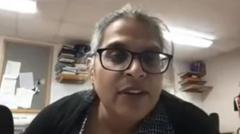ChatGPT shares data on how many users exhibit psychosis or suicidal thoughts
NegativeHealth

Recent data from ChatGPT reveals that potentially hundreds of thousands of users may be exhibiting signs of psychosis or suicidal thoughts each week. This alarming statistic highlights a growing mental health crisis that demands attention and action. Understanding the scale of mental health distress among users is crucial for developing effective support systems and interventions.
— Curated by the World Pulse Now AI Editorial System





